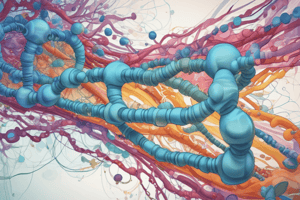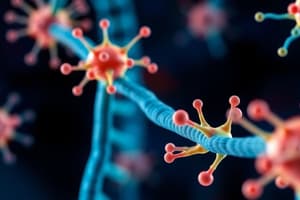Podcast
Questions and Answers
What is the primary function of protein kinase A in the activation of gene expression through cAMP?
What is the primary function of protein kinase A in the activation of gene expression through cAMP?
- Inhibition of transcription factors
- Degradation of mRNA
- Binding of RNA polymerase
- Phosphorylation of CREB (correct)
How is the transferrin receptor mRNA stabilized during low iron concentrations?
How is the transferrin receptor mRNA stabilized during low iron concentrations?
- By acetylation of mRNA
- By increased mRNA synthesis
- By trans-acting iron regulatory proteins (IRPs) (correct)
- By binding of iron itself
Which component binds specifically to the response element GRE in the context of steroid hormones?
Which component binds specifically to the response element GRE in the context of steroid hormones?
- Hormone/receptor complex (correct)
- RNA polymerase
- Basal transcription factors
- Coactivators
What is one of the mechanisms through which gene expression can be regulated at the DNA level in eukaryotes?
What is one of the mechanisms through which gene expression can be regulated at the DNA level in eukaryotes?
Which phenomenon can lead to drug resistance in eukaryotic cells?
Which phenomenon can lead to drug resistance in eukaryotic cells?
What is the purpose of mRNA editing in intestinal cells concerning Apo B mRNA?
What is the purpose of mRNA editing in intestinal cells concerning Apo B mRNA?
Which codon undergoes editing in the Apo B mRNA to switch the encoded amino acid from glutamine to a stop codon?
Which codon undergoes editing in the Apo B mRNA to switch the encoded amino acid from glutamine to a stop codon?
Which of the following best describes the relationship between Apo B-100 and Apo B-48 proteins?
Which of the following best describes the relationship between Apo B-100 and Apo B-48 proteins?
What type of modification occurs in mRNA editing for the Apo B gene in intestinal cells?
What type of modification occurs in mRNA editing for the Apo B gene in intestinal cells?
What does the difference in size between Apo B-100 and Apo B-48 proteins indicate about their synthesis?
What does the difference in size between Apo B-100 and Apo B-48 proteins indicate about their synthesis?
What role do general (basal) transcription factors play in transcription initiation?
What role do general (basal) transcription factors play in transcription initiation?
Which type of transcription factors bind to enhancer sequences?
Which type of transcription factors bind to enhancer sequences?
How do specific transcription factors modulate the efficiency of transcription initiation?
How do specific transcription factors modulate the efficiency of transcription initiation?
What is the primary function of coactivator proteins in transcription regulation?
What is the primary function of coactivator proteins in transcription regulation?
Which of the following mechanisms does NOT contribute to the regulation of transcription?
Which of the following mechanisms does NOT contribute to the regulation of transcription?
What is required for the bending of the DNA molecule in transcription regulation?
What is required for the bending of the DNA molecule in transcription regulation?
Which of the following best describes constitutive genes?
Which of the following best describes constitutive genes?
What defines the specific transcription factors as activators or repressors?
What defines the specific transcription factors as activators or repressors?
What type of gene expression is influenced by DNA-related mechanisms in eukaryotes?
What type of gene expression is influenced by DNA-related mechanisms in eukaryotes?
What is the function of enhancer sequences in gene transcription?
What is the function of enhancer sequences in gene transcription?
What type of epigenetic mechanism modifies DNA accessibility to transcription machinery?
What type of epigenetic mechanism modifies DNA accessibility to transcription machinery?
Trans-acting factors are characterized by which of the following?
Trans-acting factors are characterized by which of the following?
Which statement regarding regulated genes is accurate?
Which statement regarding regulated genes is accurate?
Silencer sequences serve to:
Silencer sequences serve to:
How does control at the level of posttranslational processes differ from transcriptional control?
How does control at the level of posttranslational processes differ from transcriptional control?
Which of the following describes a key characteristic of transcriptional control?
Which of the following describes a key characteristic of transcriptional control?
What form of chromatin is associated with actively transcribed genes?
What form of chromatin is associated with actively transcribed genes?
What effect does acetylation of histone proteins have on chromatin structure?
What effect does acetylation of histone proteins have on chromatin structure?
Which process reverses the effect of histone acetylation?
Which process reverses the effect of histone acetylation?
What is the function of DNA methyltransferase in gene expression?
What is the function of DNA methyltransferase in gene expression?
How does DNA methylation directly affect transcription?
How does DNA methylation directly affect transcription?
What is primarily observed in transcriptionally active chromatin?
What is primarily observed in transcriptionally active chromatin?
What typically precedes the methylation of cytosines in vertebrate DNA?
What typically precedes the methylation of cytosines in vertebrate DNA?
What is the main effect of chromatin remodeling on transcription machinery?
What is the main effect of chromatin remodeling on transcription machinery?
Flashcards
Chromatin Remodeling
Chromatin Remodeling
A process that alters the structure of chromatin, making DNA more or less accessible for transcription.
Euchromatin
Euchromatin
The relaxed form of chromatin where DNA is more accessible for transcription.
Heterochromatin
Heterochromatin
The tightly packed form of chromatin where DNA is less accessible for transcription.
Histone Acetylation
Histone Acetylation
Signup and view all the flashcards
Histone Deacetylation
Histone Deacetylation
Signup and view all the flashcards
DNA Methylation
DNA Methylation
Signup and view all the flashcards
DNA Demethylation
DNA Demethylation
Signup and view all the flashcards
Promoter
Promoter
Signup and view all the flashcards
Constitutive genes
Constitutive genes
Signup and view all the flashcards
Regulated genes
Regulated genes
Signup and view all the flashcards
Transcription
Transcription
Signup and view all the flashcards
Cis-acting elements
Cis-acting elements
Signup and view all the flashcards
Promoter sequences
Promoter sequences
Signup and view all the flashcards
Enhancer sequences
Enhancer sequences
Signup and view all the flashcards
Silencer sequences
Silencer sequences
Signup and view all the flashcards
Trans-acting transcription factors
Trans-acting transcription factors
Signup and view all the flashcards
Specific Transcription Factors
Specific Transcription Factors
Signup and view all the flashcards
Co-activators
Co-activators
Signup and view all the flashcards
Basal Transcription Factors
Basal Transcription Factors
Signup and view all the flashcards
Enhancers
Enhancers
Signup and view all the flashcards
Silencers
Silencers
Signup and view all the flashcards
Epigenetics
Epigenetics
Signup and view all the flashcards
Cell-surface hormone
Cell-surface hormone
Signup and view all the flashcards
cAMP
cAMP
Signup and view all the flashcards
Protein kinase A
Protein kinase A
Signup and view all the flashcards
CREB
CREB
Signup and view all the flashcards
CRE (cAMP response element)
CRE (cAMP response element)
Signup and view all the flashcards
What is mRNA editing?
What is mRNA editing?
Signup and view all the flashcards
What happens in Apo B mRNA editing?
What happens in Apo B mRNA editing?
Signup and view all the flashcards
What are Apo B-100 and Apo B-48?
What are Apo B-100 and Apo B-48?
Signup and view all the flashcards
What is deamination of cytosine?
What is deamination of cytosine?
Signup and view all the flashcards
How does mRNA editing contribute to tissue diversity?
How does mRNA editing contribute to tissue diversity?
Signup and view all the flashcards
Study Notes
Course Information
- Course: BMS 141
- Lecture Number: 12
- Title: Regulation of Gene Expression
- Instructor: Dr. Lamees Dawood
- Program: Medicine and Surgery
- Semester: Fall 2024
- University: Galala University (Powered by Arizona State University)
Gene Regulation: Different Control Sites
- Regulation occurs at various levels:
- Transcriptional level
- Posttranscriptional mRNA level
- Posttranslational level
- DNA-related mechanisms in eukaryotes
Constitutive vs. Regulated Genes
- Constitutive (housekeeping) genes:
- Continuously expressed
- Encode proteins for basic cellular functions
- Regulated genes:
- Expressed only under specific conditions
- Expressed in all cells or a subset
- Expression regulated by factors like where, when and how much
Transcriptional Level Regulation
- Synthesis of RNA directed by DNA-dependent RNA polymerase
- Cis-acting elements: DNA sequences on the same chromosome as the gene, regulating its transcription
Cis-Acting DNA Sequences
- Promoters:
- Located upstream of the transcription start site (+1)
- Binding sites for basal transcription factors and RNA polymerase
- Enhancers:
- Located upstream or downstream of the start site
- Thousands base pairs away from the promoter
- Binding sites for specific transcription factors (activators)
- Silencers:
- Similar to enhancers
- Bind specific transcription factors (repressors)
Trans-Acting Transcription Factors (Protein Factors)
- Encoded by different genes
- Synthesized in the cytosol and move to nucleus
- General (basal) factors:
- Recognize and bind to promoter sequences
- Specific factors (activators/repressors):
- Bind to DNA sequences (enhancers/silencers) regulating transcription
- Respond to different signals (e.g., hormones)
- Co-activators:
- Interact with specific transcription factors and control transcription activity
- Do not bind to DNA
General or Basal Transcription Factors (TFs)
- Bind to consensus sequences of promoters (e.g., CTF, SP1, TFIID)
- Facilitate assembly of the initiation complex and recruitment of RNA polymerase II
- Catalyze basal or constitutive transcription
Specific or Regulatory Transcription Factors (TFs)
- Bind regulatory sequences (enhancers or silencers)
- Modulate transcription initiation efficiency
- Mediate responses to signals (e.g., hormones)
- Regulate gene expression at specific times
Specific/Regulatory Mechanism
- TFs interact with:
- DNA sequences (enhancers/silencers)
- General TFs and RNA polymerase II in the initiation complex
- Coactivators (e.g., histone acetyltransferase)
DNA Bending
- DNA bending can allow interaction between specific TFs and basal TFs and RNA polymerase II at promoter region
- Specific TFs (bound to enhancer/silencer DNA sequences) interact distally (far from the promoter) with basal TFs
Epigenetic Mechanisms - Regulation of Transcription Control
- Chromatin remodeling:
- Acetylation and deacetylation by histone proteins
- Acetylation reduces positive charge, increases accessibility and relaxed chromatin (euchromatin)
- Deacetylation restores condensed chromatin (heterochromatin - inactive)
- DNA methylation:
- Addition of methyl groups to cytosine bases (CpG dinucleotides) at the gene promoter
- Prevents binding of basal transcription factors
- May recruit histone deacetylase, increasing heterochromatin formation
Euchromatin and its effect on Transcription
- Following acetylation, nucleosomal removal, the promoter opens, becoming accessible to the transcription machinery, activating transcription
mRNA Posttranscriptional Regulation
- Splice-site choice and differential tissue expression
- mRNA editing: modifications after full processing (e.g., apo B mRNA)
- mRNA stability
- Coordinate gene expression in eukaryotes (influenced by hormonal factors, e.g., glucagon)
mRNA Editing (e.g., Apo B mrna)
- Apo B mRNA (4563 codons) expressed in hepatocytes and small intestinal cells
- Production of two different protein sizes (Apo B-100, Apo B-48) performing different functions in cell processes
Coordinate Expression in Eukaryotes (Hormonal effects)
- Cell-surface hormones (e.g., glucagon) activate signal transduction
- Regulation is influenced by protein kinase A (PKA) and other factors that activate CREB proteins which bind to CRE sequences in the promoter region, affecting gene expression
Regulation of mRNA Stability
- Transferrin (iron transport protein)
- When iron concentration is low, iron regulatory protein (IRP) binds to iron response elements (IRES) on transferrin mRNA
- Stabilizing the mRNA, and increasing transferrin receptor synthesis
Regulation of Gene Expression by DNA-related Mechanisms in Eukaryotes
- DNA accessibility (by transcription machinery): eg., chromatin remodeling, methylation
- DNA copy number variation (e.g. drug resistance)
- DNA rearrangements (e.g. Ig production)
- Transcription machinery effects by DNA and transcription factors
Studying That Suits You
Use AI to generate personalized quizzes and flashcards to suit your learning preferences.




